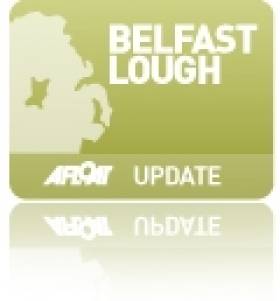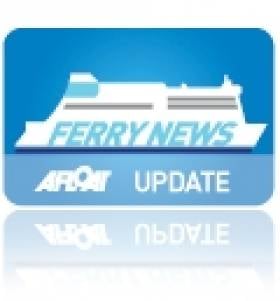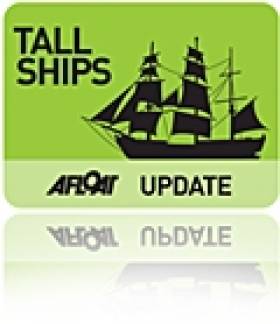Displaying items by tag: Marine Accident Investigation Branch
MIAB Report into Belfast Lough Collision Finds Fault on Both Sides
#BELFAST LOUGH - Inappropriate actions by the bridge teams of two vessels contributed to their collision in Belfast Lough earlier this year, according to the official report into the incident by the UK's Marine Accident Investigation Branch (MIAB).
BBC News reports on the MIAB's findings in its investigation into the collision of the container ship Union Moon and passenger ferry Stena Feronia on 7 March last, which resulted in substantial damage to both vessels.
The Stena Feronia, which was heading into port en route from Birkenhead, made contact with the Union Moon near the Fairway Buoy about 1km from the shore between Carrickfergus and Helen's Bay.
The report found that the Union Moon's captain made an inappropriate course alteration on leaving port while under the influence of alcohol which put it in the direction of the inbound ferry.
The captain of the Union Moon, 55-year-old Miroslaw Pozniak, was subsequently arrested and charged with 'excess alcohol by the master of a ship', and later sentenced to a year's imprisonment.
However, the MIAB also determined that the decision by the master of the Stena Feronia to leave his bridge "at a time when his ship was effectively under pilotage and approaching the harbour limit of Belfast, with a converging outbound vessel, was unwise".
In addition, there was a delay on the part of the ferry's pilotage exemption certificate (PEC) holder in taking corrective action due to a lack of "precautionary thought" and "appreciation of the limited time available", while sub-standard VHF communications on the Stena Feronia were also called into question.
Meanwhile, the MIAB report added that they was a lack of clear guidance regarding traffic flow around the Fairway Buoy.
The incident was the second involving excess alcohol by a ship's master in UK waters in six months, following the beaching of the container vessel Karin Schepers on the Cornish coast in August 2011.
The complete MAIB report into the incident is available HERE.
#FERRY NEWS - The captain of the cargo ship Union Moon, who was arrested after his vessel collided with a passenger ferry in Belfast Lough, has been charged with 'excess alcohol by the master of a ship'.
BBC News reports that the 55-year-old was set to appear in court today, following his arrest yesterday.
No one was injured in the incident on Wednesday, when the Union Moon collided with the Stena Feronia close to the Fairway buoy between Carrickfergus and Helen's Bay. Both vessels were substantially damaged.
The cargo ship, which was carrying 2,000 tonnes of aggregate, was brought back to Belfast. Philip McNamara of the Donaghdee lifeboat confirmed that a large section of her bow was missing.
Meanwhile, engineers from Stena Irish Sea are assessing the damage to their vessel to determine how long it will be out of service. The Stena Feronia sails the route from Belfast to Birkenhead in Merseyside.
The Maritime and Coastguard Agency, the Marine Accident Investigation Branch and the PSNI are all involved in the investigation.
BBC News has more on the story HERE.
- Ferry news
- collision
- Belfast Lough
- cargo ship
- Union Moon
- captain
- charged
- drink
- excess alcohol
- ferry
- Stena Feronia
- Birkenhead
- Merseyside
- court
- Fairway buoy
- Carrickfergus
- Helen's Bay
- Philip McNamara
- Donaghdee
- Lifeboat
- Stena Irish Sea
- Maritime and Coastguard Agency
- Marine Accident Investigation Branch
- psni
Ocean Youth Trust 'Reviews Procedures' in Wake of Lord Rank Sinking
Following the sinking of Ocean Youth Trust's (OYT) Lord Rank on June 8th and the UK's Marine Accident Investigation Board's subsequent examination, OYT has taken 'a number of actions to ensure the future safe operation' of its vessels. This includes 'a review of its procedures and their implementation on board', according to an MAIB report HERE.
The report says The Lord Rank was engaged in a charity fund-raising event last June 8 and was scheduled to call at a number of Northern Ireland ports. The vessel completed her fund-raising activities at Ballycastle and departed port at 2100 with three crew and three passengers on board. The next port of call was Portrush, a passage of about 3 hours under power. No passage planning was undertaken. On clearing the breakwater, the skipper ordered the helmsman to head in a northerly direction. About 10 minutes later he ordered the helmsman to alter course to port and head towards a visual reference point. No further position monitoring was undertaken. The vessel went aground on Carrickmannanon Rock at about 2123. The skipper then broadcast a 'PAN PAN' message on VHF radio that was acknowledged by the Coastguard. A rescue operation involving a helicopter, an inshore lifeboat and an all weather lifeboat ensured that the crew and passengers were landed safely ashore. STV Lord Rank subsequently sank.
The Marine Accident Investigation Branch (MAIB) examines and investigates all types of marine accidents to or on board UK ships worldwide, and other ships in UK territorial waters.
The Chief Inspector of Marine Accidents has written to Ocean Youth Trust Ireland emphasising that 'professional standards need to be maintained at all times'.
The OYT's agm will be held at Balyholme Yacht Club in Bangor, Northern Ireland on October 18th at 7pm.






























































